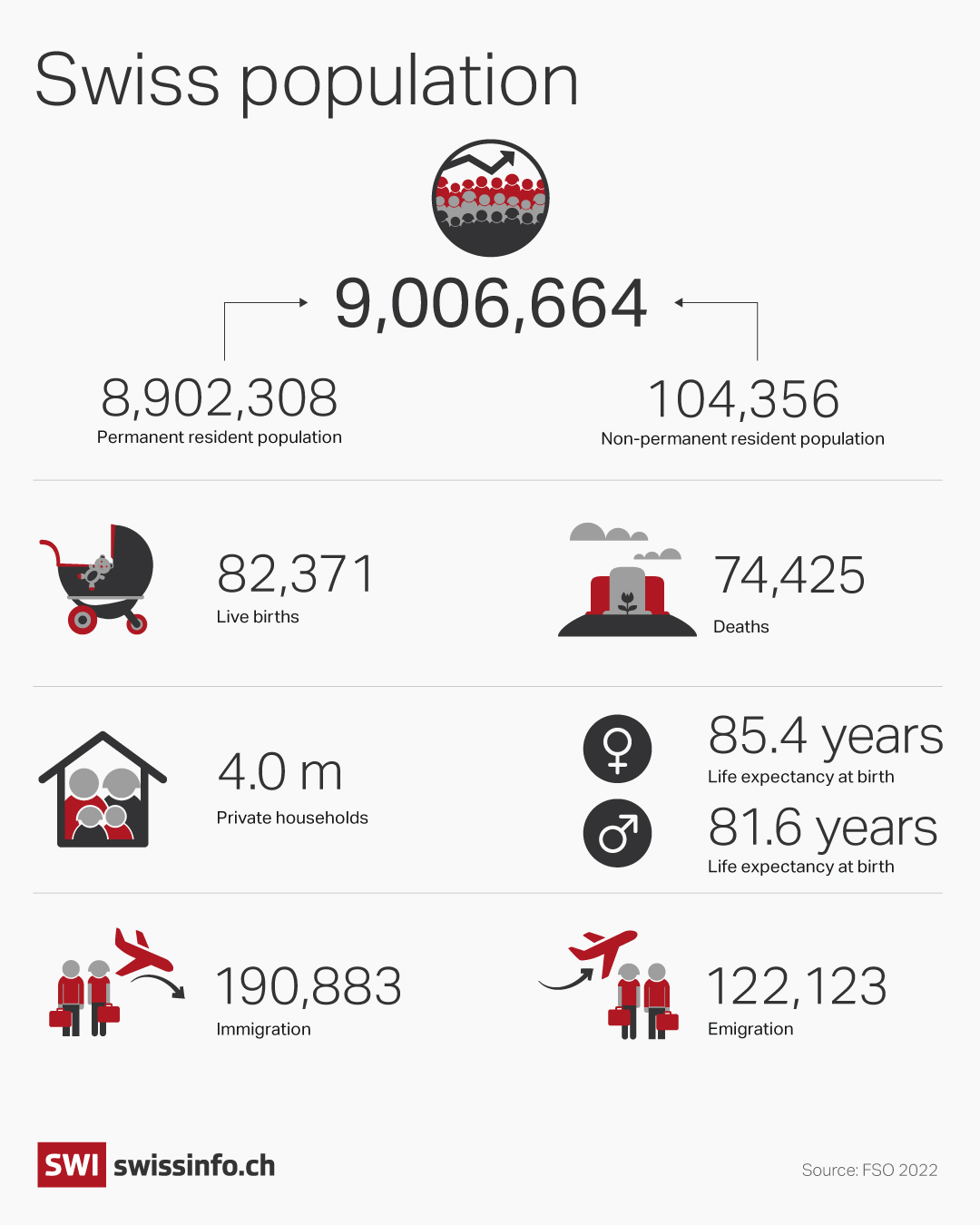
Nine million in Switzerland? ‘Not quite yet!’ say authorities

Switzerland has reportedly hit a historic population milestone: nine million people now live in the small Alpine country. But how accurate is this figure? Where did it come from? And what does it mean?
On Wednesday the media in Switzerland reported a milestone: nine million residents in Switzerland. However, upon closer inspection this number tells a more complex story.
The Federal Statistical Office (FSO) reported a permanent resident population of 8.9 million for the second quarter of 2023. “We make a distinction between the permanent residents and non-permanent residents. It was the media that combined these two figures to reach the nine million number,” said Klaus von Muralt, FSO spokesperson. The non-permanent residents in Switzerland are currently calculated at around 104,000.

How big is this milestone, really?
While the FSO makes a distinction between permanent and non-permanent residents, nine million people are currently recorded as living in the country. Over the past 20 years the Swiss population has rapidly grown.
In 2000, Switzerland’s population was 7.2 million. By 2010, the population had increased by 660,000 to 7.86 million. By 2023, however, the Switzerland population had jumped by another 1.14 million residents.
In a European comparison, the Netherlands, which has a land mass slightly smaller than that of Switzerland, has a current population of 17.9 million. Austria, however, is twice the geographic size of Switzerland but has a population of only 9.1 million. In Asia, Taiwan is roughly the same size as Switzerland but has a population of over 23.3 million.

Where has this population growth come from?
Of the 104,000 non-permanent residents, around half are short-term permit holders who remain in Switzerland for less than a year. Some 11,000 are asylum-seekers and almost 20,000 fall under protection status S, which enables the rapid admission of refugees.
Read more: Switzerland triggers unprecedented special status for Ukrainian refugees
The population growth can be attributed to various factors. Of the 2.29 million non-Swiss population, 190,800 immigrated to Switzerland in 2022 alone. In comparison, just over 122,000 left the country. In addition, as in most wealthy nations, the birth-rate is consistently higher than the death rate and life expectancy in Switzerland is over 80.
From the FSO statistic of 8.9 million, more than 39% of the population, or around 2.9 million individuals aged 15 and over, have a migration background. Ten years ago this figure was 23.8%, or 1.93 million.
As of the latest statistics taken at the end of 2022, a majority of the foreign-born population came from Europe, with the largest number coming from Germany, Italy and France – Switzerland’s neighbours.
In 2013, this was not much different. The largest numbers of individuals came from Italy and Germany, followed by Portugal.
Does national wealth make a difference?
Wealthier countries, such as Switzerland, are obviously more attractive destinations for immigration.
In 2022 Switzerland was the world’s sixth-wealthiest country, according to Forbes. Luxembourg, the wealthiest country in the ranking, has a foreign-born population of 47.2%. Taiwan and the Netherlands, countries comparable in size to Switzerland, rank 14 and 15 respectively on the Forbes list. As of June 2022, Taiwan has recorded a “new immigrant” population of only 2.5%, while the Netherlands says its foreign-born population is around 15%.
While the population of the Netherlands and Taiwan are larger, these countries have developed infrastructure to maintain this population size. What does the future look like for Switzerland’s growing population?
Can Switzerland cope with a nine million population?
Many issues have arisen in connection to the issue of a growing population. A hot topic recently has been a lack of housing and infrastructure for the population.
Real estate experts have stated Switzerland is unprepared for a population that is growing faster than official statistics predict: this year, it could increase by a record 148,000 people, rather than the 70,000 foreseen by authorities.
By 2026 there is likely to be a shortage of 51,000 homes in Switzerland, equivalent to a city the size of Lucerne, real estate consultants Wüest Partner told the NZZ am Sonntag. While Switzerland is one of the wealthiest countries in the world, it also has one of the lowest home ownerships rates.
Read more: Switzerland faces shortage of 51,000 homes, says study
However, others say the size of Switzerland is not a problem for its growing population. Sibylle Wälty, spatial development researcher at federal technology institute ETH Zurich, goes as far as to say that 16 million people could live in SwitzerlandExternal link, while maintaining the same quality of life.
The solution for a growing population is what her team calls ten-minute neighbourhoods: a dense urban network in which “everything you need in everyday life must be reachable within a ten-minute walk: bakery, supermarket, hairdresser, train station, café, restaurants, park and kindergarten,” says Wälty. “And ideally, work too.”
Read more: ‘Myth’ of spiking Swiss rents comes under scrutiny
The distinction between 8.9 million and nine million people seems to not be a point of discussion. It is not “if” this number will be hit, or even “when”. The primary question is how Switzerland chooses to develop its infrastructure to accommodate the population growth, while ensuring that infrastructure remains accessible.

In compliance with the JTI standards
More: SWI swissinfo.ch certified by the Journalism Trust Initiative






























You can find an overview of ongoing debates with our journalists here . Please join us!
If you want to start a conversation about a topic raised in this article or want to report factual errors, email us at english@swissinfo.ch.